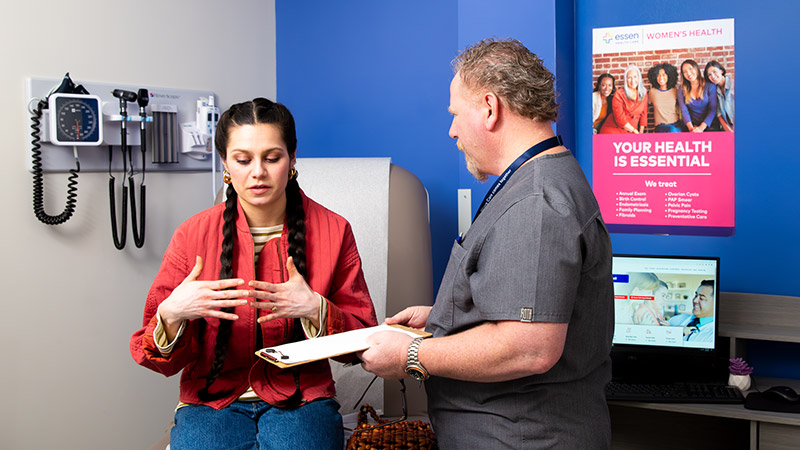
Not Feeling Like Yourself After Birth? Let’s Talk About It
Bringing a new life into the world is nothing short of extraordinary. However, your birth experience looked—whether it went as planned or took unexpected turns—your strength and courage as a mother shine through. But while everyone’s attention turns to the baby, it's just as important to focus on someone else — you.
Dr. Dinesen, Medical Director of OB/GYN at Essen Health Care, shares expert insights on how new mothers can prioritize their physical recovery and emotional well-being in the critical weeks following childbirth. Because postpartum care isn’t just about healing — it’s about helping you thrive.
Fuel Your Body: Nutrition for Healing and Energy
Your body has just completed one of the most energy-intensive processes it will ever go through. Recovery begins at the cellular level with the right nutrients that help your body heal and give you the energy to take on your new chapter.
- Iron-rich foods like leafy greens, lentils, and red meat help replenish blood loss and combat postpartum fatigue.
- Vitamin C (oranges, bell peppers, strawberries) improves iron absorption and supports tissue repair.
- Omega-3s (salmon, chia seeds) aid in mood regulation and support baby’s brain development if breastfeeding.
- Hydration is non-negotiable — aim for 2.5–3 liters of water daily, more if breastfeeding.
Pro Tip: Prepare “recovery plates” in advance with protein, healthy fats, and slow-digesting carbs — then refrigerate or freeze for those no-time-to-cook moments.
Sleep, Stress & Hormones: How to Recharge in a Sleepless Season
While your baby might set their own pace, your recovery deserves its own space and rest. Dr. Dinesen explains that postpartum hormone regulation, immune function, and mental clarity are all tied to sleep quality.
Even if full nights aren’t possible, try:- Power naps (15–30 minutes) during the day to reduce cortisol levels.
- Use white noise machines and blackout curtains to deepen rest, even if it’s brief.
- Sleep hygiene counts: avoid screens before bed, and wind down with calming music, tea, or deep breathing.
Mindful Tip: Set a 10-minute “quiet hour” during the day — baby rests, and so do you. Phone off. Feet up.
Emotional Recovery: Protecting Your Mental Health After Birth
The postpartum period is emotionally complex. While joy is present, so can anxiety, sadness, or numbness. Dr. Dinesen encourages new mothers to be vigilant, not ashamed of their mental state.
Know the signs of postpartum mood disorders:- Crying spells, irritability, or anxiety that last more than two weeks
- Trouble bonding with the baby
- Intrusive thoughts or fears that interfere with daily life
- Withdrawal from loved ones
Regular postpartum check-ins with your OB/GYN can help identify signs of emotional or physical struggles early, allowing for timely support and intervention.
Counseling provides a safe, supportive space to process emotions, manage stress, and navigate the emotional challenges of the postpartum journey.
Lifestyle practices such as meditation, journaling, and support groups can promote calm, reduce stress, and support emotional balance during recovery.

When Breastfeeding Hurts — And What to Do
While breastfeeding can be rewarding, it may come with some challenges for many new mothers. It's common for mothers to experience some discomfort when they first begin their breastfeeding journey. However, that’s not how it should stay. According to Dr. Dinesen, pain is not a normal part of breastfeeding, and it often signals a fixable issue.
Watch out for:- Painful latching, which can be corrected with positioning support or evaluation
- Cracks, bleeding, or blisters — these are red flags, not rites of passage.
- Engorgement, blocked ducts, or mastitis, which can escalate quickly without medical attention.
- Same-day OB/GYN visits
This Is Your New Chapter — Own It
At Essen Health Care, we offer a comprehensive postpartum care program designed for the real needs of new moms. That includes:
- Same-day visits
- Post-birth exams & pelvic floor support
- Support for breastfeeding, birth control, healing, and hormones
- Mental health resources tailored to your needs
You Brought Life into the World. Now Let Us Help You Reclaim Yours.
Don’t wait for a crisis to prioritize your health. Whether you’re a first-time mom or adding to your family, Essen Health Care is here to walk you through recovery — with compassion, expertise, and a whole-person approach.
About Dr. Scott Dinesen

With over 34 years of dedication to women’s health, Dr. Scott Dinesen has delivered more than 16,000 babies, performed over 10,000 surgeries, and helped countless families realize their dreams. As the Medical Director of Women’s Services—encompassing Obstetrics, Gynecology, Infertility, and Breast Surgery—he brings experience, compassion, and unwavering commitment to every patient he serves. Dr. Dinesen believes that every woman’s journey deserves expert care, heartfelt support, and the hope of a healthier tomorrow.